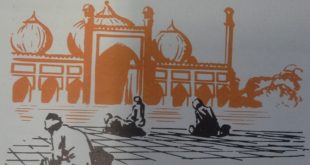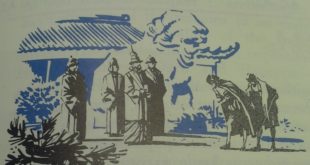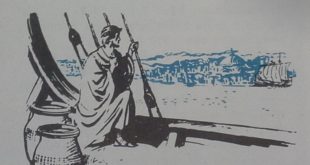Thirteen and a half centuries ago a new religion began in Arabia. Today millions of people are followers of this religion. It is called Islam and its followers, Moslems. All their lives long, Moslems must pray, in ways clearly prescribed, five times every day. No ordinary event must be allowed to interfere with these moments of prayer. Moslems must learn to recite their creed — a long statement of their religious belief. For one month each year they must fast all of every day from sunrise to sunset. They must give generously to charity. They should, if at all possible, go at least once during their lives to the holy city of Mecca, where Mohammed, the founder of Islam, began this new religion. People of other faiths are forbidden to enter Mecca. A few miles outside of Mecca, Moslems must change to pilgrims’ dress and proceed barefoot when they enter this city, high up in west-central Arabia. Mohammed and his first followers were Arabs. Arab merchants and Arab warriors, influenced the history of other peoples. United by loyalty to their religious faith, Arabs created a large empire. Arab rulers occupied positions of great influence and were keenly interested in advancing learning. How did all this come about? 1. How did the religion of Mohammed create a powerful Moslem world? 2. What kind of civilization developed in the Moslem world? 1. How did the Religion of Mohammed Create a Powerful Moslem World? Arab civilization started later than other great civilizations. The story of the Moslem world began about 600 A.D. in Arabia, a huge peninsula covered for the most part with burning desert. Arabia is separated from Africa by the Red Sea and from Iran (Persia) by the Persian Gulf. To the north and west of the Arabian peninsula is the …
Read More »The Growth of Civilization in Early China
In the same way that important ancient civilizations grew out of small beginnings in the valleys of the Nile, the Tigris-Euphrates and the Indus, so another great civilization of Early times — that of China — was cradled in the valley of the Yellow River. To be sure, China’s civilization did not commence as early as did Egypt’s, Mesopotamia’s, or India’s. The ancient Egyptian and the Mesopotamian kingdoms lost their power many centuries ago and early India never became completely united under one empire. China therefore has had a longer national life than any other ancient or modern state. It is the oldest of today’s nations. 1. How Did Early China Develop Under Various Ruling Families? China is dominated by three great rivers. China’s life, today as in olden times, centres in three river valleys. The great Hwang-Ho, Chinese for Yellow River, rises in the lofty mountains of Tibet. Winding its way slowly across the wide plain of North China, it flows into the Yellow Sea, so called because of the yellow soil the great river empties into it. Unlike Egypt or India, the North China plain has a climate like that of southern Canada, with warm summers and severe winters. The wind storms, disastrous dry spells and terrifying floods often bring destruction and misery to its inhabitants. Farther to the south is the valley of the Yangtze River. The Yangtze is one of the longest rivers in the world. In all, it flows nearly 4000 miles on its way to the sea. Still farther south is the Si, or West River. The climate of South China is warm and there is a heavier rainfall there than in North China. Many of China’s good ports are located along the southern coast. A Bronze Age civilization appeared first on the North …
Read More »The Growth of Civilization in Early India
Two hundred years before Columbus discovered America, a certain Marco Polo told strange, exciting stories to his friends and neighbours in Venice, a city in northern Italy. He had travelled, he said, to distant lands in Asia and had become rich. Europeans at that time had some general knowledge of eastern Asia and of its products, but Polo furnished detailed and colourful descriptions of magnificent cities, of strange customs and of powerful rulers who owned many palaces and lived in unheard of luxury. Marco Polo had visited the court of the khan, or ruler, of an empire that included most of east Asia as well as great islands in the Pacific and Indian Oceans. Polo had been made a public official. He had been sent on errands to the cold wastes of present day Siberia and the green Spice Islands where it was always warm. He had seen civilizations of many kinds — some primitive, some more magnificent than those in Europe. Marco Polo’s stories were so amazing that not until long after his death did most people believe them. “How,” thought Europeans, “could Asians have travelled so far on the long road from savagery without our help?” Today we know that Marco Polo’s stories were true, atleast in all important respects. We know that while Egyptians were building their pyramids and the Sumerians their temple towers in Mesopotamia, civilization was growing in India. We know also that while the Greeks and Romans were creating “the glory that was Greece and the grandeur that was Rome,” the Chinese were developing their own civilization and way of life. You will not find the empire of Alexander or the Roman Empire on a modern map of the world, as you know, but India and China still exist. Many changes have taken place …
Read More »Christianity Spread in a Divided Empire
Christianity was the movement that spread Across the Roman Empire Pointing the way for the rest of the ancient world toward belief in a single God. The year is 400 A.D. Andropolos paces impatiently up and down the deck of the merchant ship. He is eager to get back home; and to Andropolos, home is the city of Constantinople, a new capital of the Roman Empire. He can already see the walls and buildings of the great city shimmering in the distance. Now the ship is nearing the narrow Bosporus, the waterway where Europe and Asia are hardly a mile apart. The voyage from Ostia, the port of the old city of Rome, had been long and tiresome. Andropolos had been only too glad to leave Italy. The city that was once a hub of the Roman Empire, though still large, had a down at the heel look. Simultaneously the cities of northern Italy were becoming crowded with rough barbarians. Tall Germans also were filling the ranks of Roman legions. In times past, men such as these had been defeated again and again by Roman armies made up of men from Italy, but those victories had been won long ago and Rome had no such fighters left. Yes, Andropolos is thankful to leave Italy. Here in Constantinople the authority of the Roman emperor still counts. Andropolos shakes his head sadly as he recalls what has happened — the Roman Empire is not what it used to be. For Andropolos, though he is Greek born and Greek speaking, proudly calls himself a Roman citizen. The walls of Constantinople on the left grow closer as the ship enters the Bosporus. Soon it will dock in the harbour of the Golden Horn and Andropolos’ long voyage will be over. When he steps ashore, …
Read More »The Roman Empire Preserves and Extends Civilization
Today we speak the words, “I am a World citizen,” with pride. To the people of the ancient world the statement, “I am a Roman citizen,” was a badge of high honour. Beginning as a small city state in Italy, Rome grew into a vigorous republic and finally into an empire so mighty that it included the whole of the Mediterranean world. Even after Rome’s grandeur had waned, its influence lived on among later peoples. Rome’s history is a reminder that the destiny of a nation rests more on the wisdom of its leaders and the character of its people than it does on military might and economic strength. Consider for a moment the two following scenes from Roman history. (1) The year is 216 B.C. It is a sad day in Rome. Word has just been brought of a great disaster. A Carthaginian general named Hannibal has invaded Italy and has just wiped out the Roman army that faced him. Rome’s allies are wavering in their loyalty. Some have already gone over to the enemy. An immediate attack on Rome is expected. Yet, the Senate (Rome’s council of state) refuses to give up hope and calls upon the citizens for fresh troops and supplies. It puts the city in a state of siege, or on the alert for final defense against destruction. It refuses to pay a ransom for Romans taken prisoners by the Carthaginians. When the Roman general who lost the battle returns with a handful of soldiers, he is not criticized. Instead, the Senate praises him for not giving up hope of saving the state. The confidence of the Senate was justified. Fifteen years later, it was Carthage and not Home that was conquered. In this crisis you see the Romans showing qualities which made them great: courage …
Read More »The Greeks Lead the Way
If you had been a citizen of the ancient Greek city of Athens on a fine spring morning in 409 B.C., you would have gathered with thousands of your fellow citizens on a hillside inside the city. You would then have listened carefully to the discussion of various matters of business, conducted by the chairman and secretary of the meeting from a platform below and facing you. You would have seen an Athenian citizen thread his way from the hillside to this platform. This was a sure sign that he had a proposal to make to the voters. The citizen turned toward the assembled throng and spoke in a strong, clear voice. A man named Thrasybulus, he said, should be rewarded with a golden crown for his services to Athens. When the speaker paused, another citizen came to the platform. Yes, by all means thank Thrasybulus and give him a golden crown, urged the second speaker. He went on, these acts were not enough, because Thrasybulus was a foreigner, the best reward for serving Athens so faithfully and so well would be to make him an Athenian citizen. Would the voters of Athens do this? he asked. The chairman called for a vote by a show of hands and tellers counted the votes. A majority was in favour of the proposal and it was declared officially to have been approved by the voters of Athens. The secretary had a copy of the proposal carved on a marble slab to make the record permanent and there the record is to this day, over 2800 years later, but still readable! This old record tells us that Athenian citizens held meetings, discussed their own problems, and decided for themselves What they would do. The voters, instead of a pharaoh or a king, made …
Read More »





